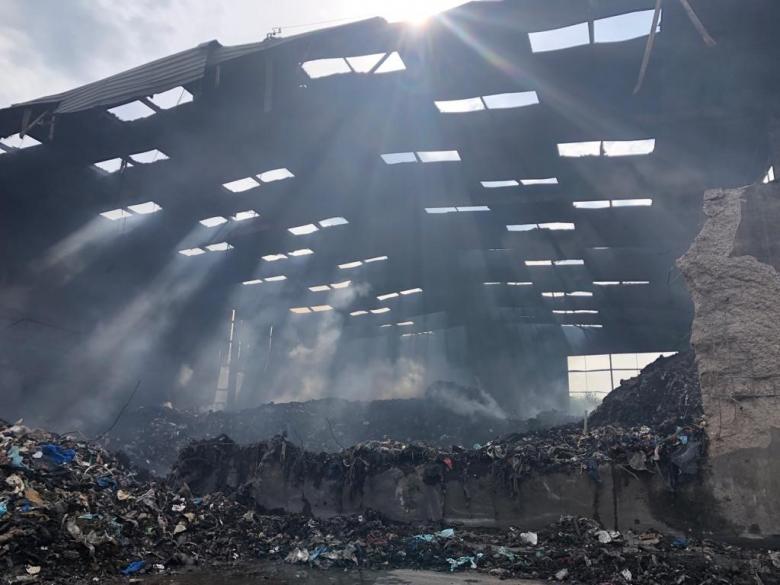
Results from air quality tests around the site, have shown that risks to health are ‘low’ and no asbestos has been found.
Telford & Wrekin Council have been monitoring air quality on a daily basis using equipment from the Environment Agency EA and analysis of data by Public Health England (PHE) Midlands.
In addition, a council-appointed contractor, continues to monitor concentrated areas of the smoke plume in line with changing wind directions. This data is also being shared with PHE and the EA.
The scale of the fire did not meet the air quality monitoring threshold set out by the EA and PHE, but partners are addressing concerns from affected residents to provide reassurance beyond the usual response.
Telford & Wrekin Council Leader, Councillor Shaun Davies said:
“Living just minutes from the site, I completely understand residents’ concerns. Faced with the possibility of several months of disruption for residents, businesses, schools and passing traffic on the M54, this was something we deemed unacceptable and felt we could not allow to continue.
“We chose an alternative - to find a way of putting the fire out quickly. With nobody available to pay to put out the fire and clean up the site, we took the decision to contribute £200,000 and will make every effort to recover that cost.
“We have gone above and beyond in our response to this fire to reassure everyone and to bring this to a conclusion as quickly as possible.
“The council obtained air data from the Environment Agency’s ambient air quality monitoring team. This takes readings from a fixed position while our contractor follows the moving smoke plume to take further readings and give us an overall picture on a daily basis.
“It is reassuring to find that, despite the smoke being unpleasant and an inconvenience, the risks to health are low, however because any smoke is an irritant, it is advisable to avoid the smoke if you can and, if indoors, keep doors and windows shut.”
Shropshire Fire and Rescue Service, Assistant Chief Fire Officer Dan Quinn said:
“The additional support from partners means we have been able to dismantle the building quickly and therefore reduce the length of the incident. This minimises the longer term impact of the fire and ensures the safety of firefighters who continue to work tirelessly on site.
“We can confirm that the building – which is metal sheeted with a steel structure and roller shutter doors – does not consist of asbestos-containing material and no materials containing asbestos have been found within the waste on the site.”
“Work is continuing in the most cost-effective way to drag waste from the building so it can be extinguished and then processed for safe storage on site. We have worked through around 10per cent of the waste with an expectation that the incident will be resolved within a few weeks if our teams are able to continue safely at this rate.
“Residents should be aware that smoke levels will continue to rise and fall in line with weather conditions and activity on site.
“There is also the potential for smaller fires to ignite which we will continue to monitor and extinguish quickly.
“We are very aware of the impact this is having in the area and will continue to monitor air and water quality with our partners and would like to thank residents for their continued patience.
“If you smell smoke where you live, as a precaution keep doors and windows closed and check for road closures on the M54.
“For a relatively small Fire and Rescue Service, an incident of this scale requires a lot of resources and dedication from our staff throughout the organisation.
I would like to thank them in particular for their continued efforts to bring this incident to its resolution.”
Dr Musarrat Afza, Health Protection consultant with Public Health England (PHE) in the West Midlands, said:
“During long-running fires, concentrations of substances in smoke are often below those which pose an immediate risk to health, but may still result in discomfort or temporary health effects. It should be remembered that short-term, temporary effects do not mean that long-term health effects should be expected.
“People with asthma and other respiratory conditions may be particularly susceptible to the smoke and should carry and use their medication (such as inhalers) as usual. If you have any concerns about the smoke’s impact on your health please call your GP surgery for advice, following any instructions for out of hour services, or contact the NHS 111 service (which is free from both landlines and mobiles and open 24/7).”
“Those people who are affected will mostly have immediate effects such as coughing or a tight chest. These symptoms usually disappear very soon after the exposure has stopped and do not lead to any long-term health problems.
Further air quality results will be published regularly and for the latest updates, register at www.Telford.gov.uk/fire or visit www.shropshirefire.gov.uk




